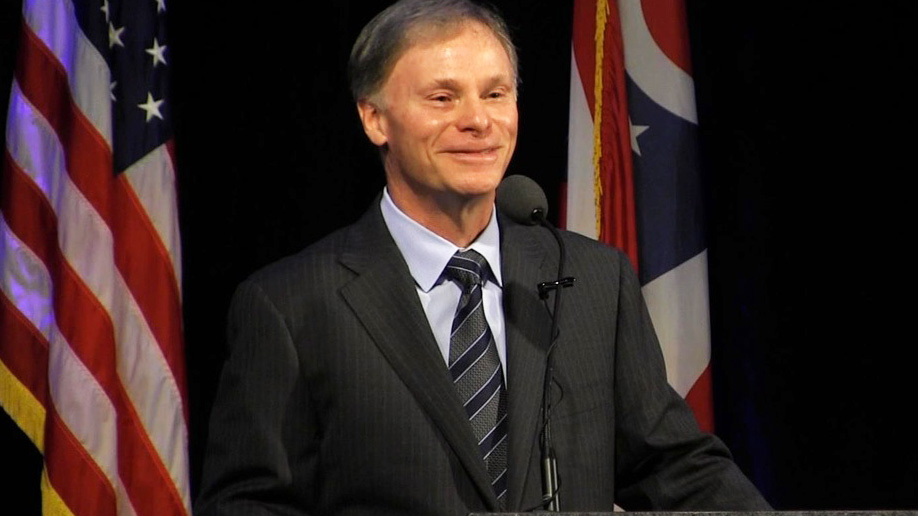FNB Economist’s Outlook: Continued Sluggish Growth
BOARDMAN, Ohio – The stock markets got off to a rocky start last month but the chief investment officer of F.N.B. Corp., Jeff Wagner, sees the performance of the economy this year as essentially repeating 2015, that is, continued sluggish growth.
Wagner offered his analysis of the national and regional economies Thursday morning at the Youngstown Warren Regional Chamber’s Economic Forecast Breakfast at Mr. Anthony’s.
At a growth rate of 2.5%, the economy is a full percent below “where we want it to be,” Wagner told a filled room. “Holding us back is consumer spending,” which makes up 70% of gross domestic product or GDP.
“People have money to spend if they want to,” Wagner noted, but the “hangover from the Great Recession” remains and consumers are loath to reassume the levels of debt they took on until 2007.
Afterward, he allowed the housing market has recovered from the Great Recession and sales of autos – 17.5 million last year – should be the same this year. But consumers are holding back their spending on other items.
The U.S. economy as in a state of “national confusion,” the chief investment officer told the chamber audience. “We really don’t know where we are in the economic cycle,” that is, whether the country is on the brink of recession or, after “seven years of recovery, just beginning to gain traction.”
The business or economic cycle consists of periods of recovery and expansion followed by contraction and recession.
On the positive side, the United States essentially has full employment – the official unemployment rate stands at 5% — and low inflation. Core inflation is running at 2%, the Fed target rate. With falling food and energy prices, the rate has been closer to 0.6%.
The Chinese economy has slowed, Wagner said, to 6.2% annual growth from 6.7%. That nation “needs 7% growth to keep their economy moving.” China borrowed “to build stuff,” manufacturing plants and housing complexes that stand empty and a high-speed rail system.
The steep decline in the Chinese markets – its regulators halted trading three times last month – has been attributed as a cause of U.S. markets getting off to a rocky start.
“The big question for the U.S.,” he said, “Is what’s happening in China a warning for the United States?”
The Chinese economy, which accounts for 8% of earnings of the companies that make up the S&P Index, has affected its trading partners in the rest of the world far more than the United States, Wagner noted, because of its huge purchases of raw materials to fuel its growth. In 2008, he said, China was the major trading partner of only eight countries. In 2013, the number was 43.
Moreover, the stock markets in China are not as indicative a barometer of the health of its economy as U.S. stock markets are of the domestic economy.
“Their stock market is just a game to them [Chinese investors],” Wagner said, “not a reflection of their economy. It’s totally opposite of ours. [So,] no, they’re not going into a recession” although the Chinese government has counted on the U.S. economy achieving 3.4% to 3.5% growth by this time “to pick up their slack.”
European markets, which account for 12% of the earnings of S&P companies, has been quiet after the scares Greece, Italy, Portugal and Spain gave. They constitute only 15% of the European Union economy. The remaining 85%, “the good parts” led by Germany, Britain and France – are healthy albeit growing at a 1% annual rate.
“What does all this mean to Youngstown-Warren?” Wagner asked. The makeup of the Valley economy pretty much reflects the makeup of the national economy, he said. The health care, education, construction and retail sectors are nearly identical. The biggest difference is government, his charts showed. When the public sector accounts for 18% of the national economy, it’s only 12% in Mahoning and Trumbull counties.
Hence, Wagner sees the performance of the Valley economy reflecting that the U.S. economy.
What’s holding back consumer spending, Wagner asked rhetorically, and what does this portend? There’s a school of thought that baby boomers are entering retirement and so have fewer needs and a reputation for being “more tight-fisted,” a premise he disagrees with.
There are more millennials than boomers, he pointed out 83 million to 74 million. The millennials are delaying settling down, getting married, buying a house and starting a family, he suggested. Where boomers settled into their responsibilities at 25, millennials are doing so at 35.
In her report on the chamber’s role in promoting the regional economy, Sarah Boyarko, senior vice president for economic development, announced the following:
- 18 projects completed.
- With a total investment of $65.86 million.
- 796 new job and
- New payroll of $24.02 million
- 1,386 jobs retained
- Retained payroll of nearly $31 million
- New construction of 1.43 million square feet.
Staff, she said, coordinated more than $11 million in property acquisition and site work on projects the chamber will announce this year.
Pictured: Jeff Wagner, chief investment officer of F.N.B. Corp., addresses the Regional Chamber’s economic forecast breakfast.
Copyright 2024 The Business Journal, Youngstown, Ohio.



